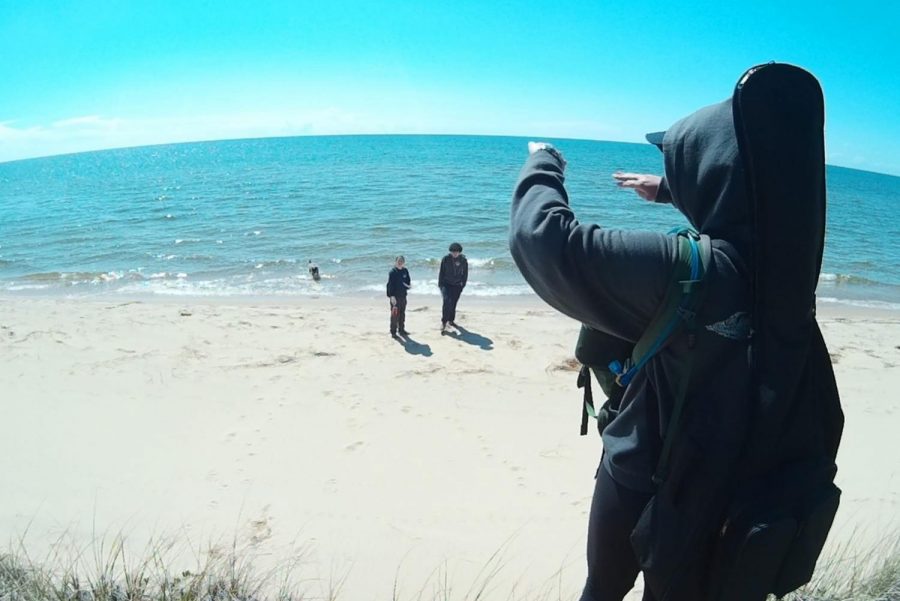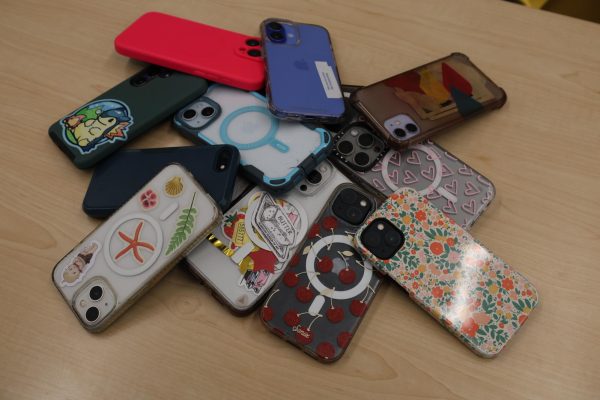Summers Unplugged
Naomi Cutler, counselor at Camp Lookout, stands on the Lake Michigan beach after having spent a day in the woods doing an activity known as “Listening Point.” During Listening Point, campers spread out in the forest, spending hours alone in nature. Some, like Cutler, brought instruments such as guitars and ukuleles. Others could be found reading, writing in notebooks, or simply laying amongst the leaves and looking up at the trees above. No matter what activities they chose to do, all the Listening Point participants were spending the day taking in the natural world—without cellphones.
As it grows more unusual for teens to not have constant access to cellphones, it also becomes more unusual for teens not to have constant access to companionship. Hundreds of conversations are just a click away with texting and forms of communication-based social media such as Snapchat, which, at a first look, seems like a great thing. What’s not to like about being able to instantly talk to someone a mile, a city, a country away from you? It turns out that phone usage is a double-edged sword. By gaining access to cellphones and social media, teenagers being found having less face-to-face interactions with their friends. In an article published in The Atlantic, it was reported that between 2000 and 2015, the number of teenagers who regularly got together with their friends had dropped by 40 percent. Even when teens are together in person, the constant access to phones often leads to feeling disconnected from the people immediately around them. This is one main reason why it’s such a good experience for children and teenagers to have access to cellphone-free memories, such as summers spent at sleepaway camps without electronics.
Campers, once disconnected from everything other than their immediate surroundings, are able to develop stronger connections with both the people and the nature around them.
“I think it helps me have more meaningful relationships with [my camp] friends, because we can connect in a more intimate way,” said Mira Strauss, a 16 year old who started going to Camp Young Judaea as a nine year old and just finished her last summer at a camp called Tel Yehudah in the summer of 2017. Strauss also stressed that the lack of access to cellphones helped her be able to more readily appreciate what was happening around her “instead of being focused on what other people are doing elsewhere.”
This same theme was heard when teenagers who went to other summer camps were asked the same questions.
“Removal from [their] cellphone teaches children to interact with each other and their environment face to face,” said Eleanor Carr, a 16 year old who started going to Camp Lookout at the age of 11. In a world where it’s growing more and more commonplace to see teenagers staring at screens instead of interacting with the world around them, Carr believes it is increasingly important to “see what life is like without your social media presence and without constant electronic stimulation.”
Many camp directors, such as Curtis McFall, share the same viewpoint as campers like Strauss and Carr. Camp Lookout, the camp McFall runs, allowed campers to bring cellphones until three years ago, when they instilled a no-cellphone policy. “We feel it’s vitally important for campers to be unplugged while at camp,” said McFall. “When connected electronics were allowed at camp, campers had a much harder time creating positive connections within the camp community. It was hard for them to be in the moment.” In addition, McFall has found that campers who are able to spend a few weeks “unplugged” gain both confidence and a greater sense of self from not being constantly preoccupied with what was going on outside of camp.
This makes sense, as constant exposure to cellphones can have detrimental effects on the mental health of children and teens. According to a study published in The Journal of Behavioral Addictions in 2015, people who used their phones an above-average amount were at a greater risk for depression and anxiety. In addition, The Atlantic has found that teens who regularly spend three or more hours a day on their cellphones are at a 35 percent higher risk of suicide, further demonstrating that young people, teenagers especially, need to be exposed to time without electronics.
The psychological benefits of being exposed to “unplugged memories,” especially in a summer camp environment, are huge. Psychology experts, working with the American Camp Association, have said that being at camp without cellphones allows campers to participate in “vital engagement.” Vital engagement is defined by the American Camp Association as “an activity so absorbing and captivating that it produces a kind of flow experience,” in addition to “continuously stretches a camper’s capacities, engaging the senses in an activity that has deep meaning.” This vital engagement is exactly the kind of thing Strauss, Carr, and McFall all talked about as the main benefit of not having electronics at camp: the fact that campers are able to be more in the moment than they would be in the phone-filled “real world.”
Within the multitude of benefits that come from young people going to summer camps, the most overarching advantage is the fact that many typical camp environments disconnect campers from electronics. Children and teenagers having access to memories free of cellphones leads to major psychological benefits, especially when those memories involve being outdoors and exploring the world. Of course, kids are only at camp for a few weeks out of their summers, but the same principles can be applied outside of a camp setting. Next time you’re at a loss for what to do, don’t spend your time mindlessly refreshing Instagram or Twitter. Instead, try putting down your phone, finding a friend, and going outside.









